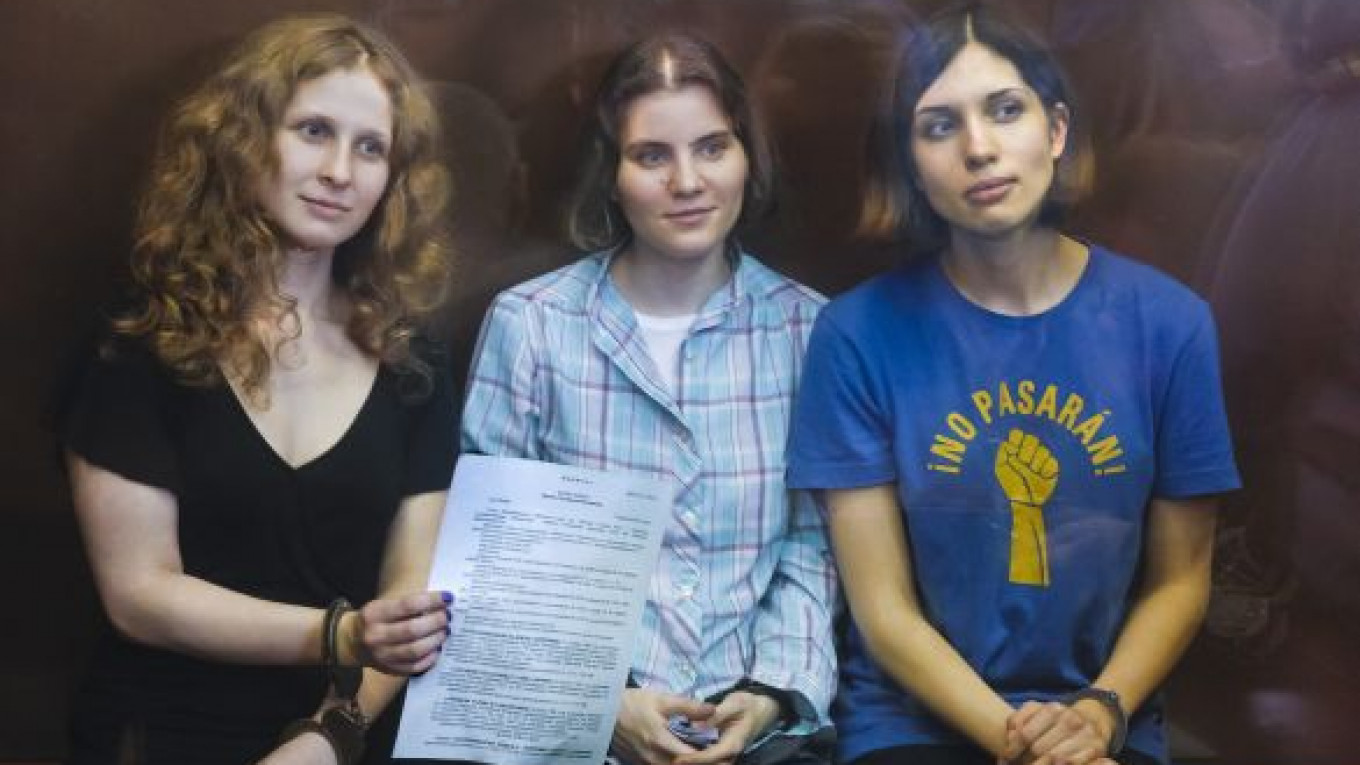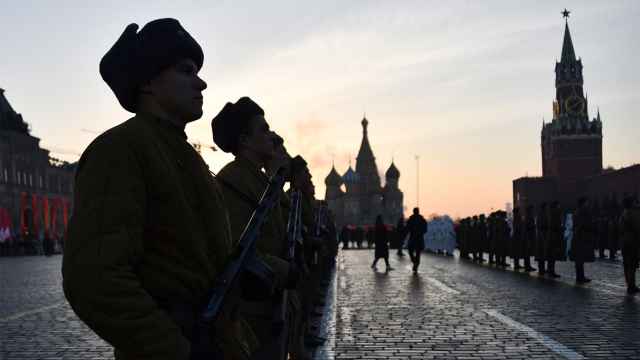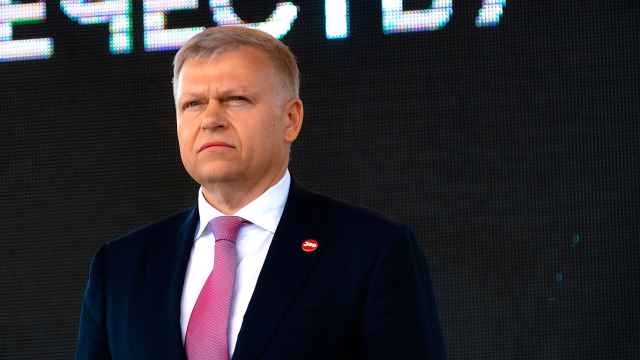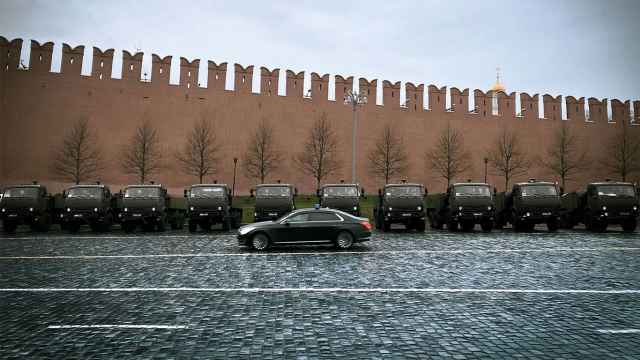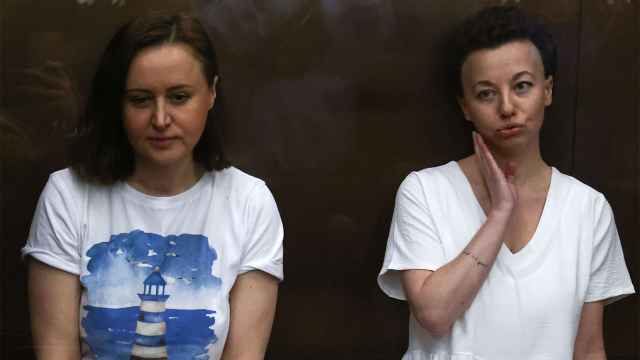Trying to protect a woman could get you in trouble if you are in the wrong place at the wrong time, Sergei Mokhnatkin argues.
Mokhnatkin said he defended a woman from police officers at a monthly unauthorized rally devoted to the freedom of assembly on Triumfalnaya Ploshchad in Moscow in December 2009.
He was later sentenced to 2 1/2 years in prison for allegedly assaulting a police officer, although he said it was actually the other way around — that it was the police who beat him up. Mokhnatkin, 59, was later pardoned, but during his almost two years in prison, he said he was routinely beaten and pressured psychologically.
Mokhnatkin's case is similar to those of many others believed to be political prisoners, whose ranks have significantly increased since Vladimir Putin's third term as president began in May 2012, human rights groups say.
Rights campaigners and opposition activists have urged Putin to release political prisoners to ease tensions between the government and civil society.
On Wednesday, the State Duma passed a bill that would grant amnesty to some of those considered political prisoners, including two members of punk protest band Pussy Riot and 30 people accused of hooliganism for a Greenpeace demonstration in the Arctic in September.
But critics have dismissed the amnesty as a farce, since many people that they consider to be political prisoners, including former oil tycoon Mikhail Khodorkovsky, will stay behind bars, and in some cases the amnesty may expire before a verdict is issued. Meanwhile, police officers accused of torture and abuse of power and some officials charged with corruption will be freed.
"It is difficult to welcome the amnesty law adopted by the Russian Duma today," said John Dalhuisen, Amnesty International's Europe and Central Asia director, in a statement Wednesday. "While it will no doubt benefit many victims of injustice, it will not erase the criminal records of those wrongfully convicted."
"This amnesty law is no substitute for an effective, independent justice system. Indeed, it is further proof of the politicization of justice in Russia," Dalhuisen said.
While most observers agree that Russia's judicial system is not completely independent or objective, the definition of the term "political prisoner" in today's Russia is not universally agreed upon.
In Soviet times it was easy to identify political prisoners, who were often charged with "anti-Soviet propaganda" and similar crimes, but it is more difficult now because they are prosecuted on ordinary criminal charges, said Alexander Cherkasov of the Memorial human rights group.
There is also a debate on whether there is a difference between political prisoners and people who were unlawfully convicted.
Current political prisoner lists in Russia include several dozen people, but For Human Rights group head Lev Ponomaryov says there are tens of thousands of unlawfully convicted people who are victims of the government's repressions.
For instance, cases against drug addicts, which constitute up to 30 percent of all criminal cases, are routinely fabricated, Ponomaryov said, adding that for him the category of political prisoner includes entrepreneurs and victims of punitive psychiatry, including children.
Irina Khrunova of the Agora human rights group voiced a similar idea, saying that she disliked the term "political prisoner" because the only difference between political prisoners and other unlawfully convicted people was a different level of media attention.
But Cherkasov argued that there was a substantial difference between the two categories, saying that "unlawful verdicts can be issued even without a political motive."
The government, for its part, denies that political prisoners exist in Russia at all.
Disputed Numbers
The number of political prisoners in the narrow sense — those prosecuted supposedly for political reasons — is also a matter of debate.
In October, Memorial compiled a list of 70 people believed to be political prisoners. In November, Vladimir Ryzhkov, a leader of the RPR-Parnas liberal political party, gave the list to Putin in an effort to secure their release, presumably through the amnesty bill passed by the Duma on Wednesday.
According to another group, the Union of Solidarity with Political Prisoners, as of Dec. 15, there were 51 people in custody who were being persecuted for political reasons, 59 people were being prosecuted on political grounds without being held in detention, and 237 people who had been targets of politically motivated cases since 2008.
Amnesty International is more strict in defining political prisoners and has been accused by some human rights activists of dragging its feet on the issue. Currently, it lists at least 14 Russians as prisoners of conscience.
Under Putin, two major cases comprise the bulk of political prisoner lists. According to Memorial, one of them includes 20 people who are either in custody or under house arrest in connection with the investigation into alleged riots at an opposition rally on Bolotnaya Ploshchad in May 2012. The other one involves 28 Greenpeace activists and two journalists previously held in custody for their alleged participation in a protest at an Arctic oil rig in September, though they have been released on bail since Memorial's list was published in October.
All the people detained as a result of the Greenpeace protest and at least four of those held in detention as part of the Bolotnoye case are set to be granted amnesty, according to the terms of the bill passed Wednesday. If they are freed, Memorial's list of 70 people will become significantly smaller.
Memorial's list also includes three people imprisoned as part of the high-profile case against now-defunct oil company Yukos and two members of the Pussy Riot punk group, who are in prison for performing an anti-Putin song in the Christ the Savior Cathedral in February 2012.
The Pussy Riot members, Nadezhda Tolokonnikova and Maria Alyokhina, are expected to be amnestied, though this move has been criticized by some observers as a mere formality, since their terms expire in March 2014. But the amnesty will not apply to the Yukos executives, who include the oil company's former head Mikhail Khodorkovsky, and earlier this month Interfax cited unidentified officials as saying the authorities were investigating a money laundering case that could keep Khodorkovsky behind bars after the end of his term next year.
The current number of political prisoners in Russia pales in comparison to the numbers in the Soviet Union, where millions of people were persecuted for political reasons under Josef Stalin and thousands under Leonid Brezhnev. After the fall of the Soviet government, during President Boris Yeltsin's tenure from 1991 to 1999, there were virtually no political prisoners, according to some human rights groups.
Going by Memorial's list, the present number of political prisoners in Russia is much smaller than in certain other countries, such as North Korea, where an estimated 150,000 to 200,000 people are held in political concentration camps, and Uzbekistan, where more than 2,000 political prisoners exist, according to human rights activist Nadezhda Atayeva, who heads the Paris-based Association for Human Rights in Central Asia. In China, there were 1,308 political prisoners as of Oct. 10, according to the U.S. Congressional Executive Commission on China.
In neighboring Belarus and Ukraine, political prisoner lists are shorter and include, respectively, about a dozen people and one person, according to local human rights groups. The one person in Ukraine is a highly important one, however: former Prime Minister Yulia Tymoshenko.
Lesser-Known Names
One of the lesser-known prisoners on the Memorial list is Taisia Osipova, an activist of the Other Russia opposition party who was sentenced in 2011 to 10 years in prison for drug trafficking and had her term commuted to eight years in 2012.
Khrunova, of the Agora human rights group and also Osipova's lawyer, said by phone that Osipova had likely been prosecuted because of her links to Other Russia and that drugs were planted in her apartment as part of a police setup.
However, some observers, such as journalist Yulia Latynina, dispute the claim that Osipova is a political prisoner, arguing that she was a drug addict, though Khrunova said no evidence for that had been presented.
Other Russia leader Eduard Limonov and many other activists of the radical opposition party have been on political-prisoner lists on and off since Putin came to power in 1999, though some of them, including Limonov, have been released. Apart from Osipova, Memorial's list also includes Other Russia member Sergei Cherepovsky, who has been in detention since May on charges of assaulting a police officer.
Three more activists of the Other Russia party, which espouses a mix of communist and nationalist ideas, were detained in December 2010 for participating in a nationalist riot on Manezh Square triggered by the killing of soccer fan Yegor Sviridov by a person of Caucasus descent. They were also listed by Memorial as political prisoners.
One more nationalist on the list, Daniil Konstantinov, was arrested in March 2012 and charged with murder, though his defense team says he has an alibi, as several witnesses testified that he was at his mother's birthday party at the time of the killing.
Daniil's father, Ilya Konstantinov, said by phone that Daniil's arrest was linked to his participation in several major rallies against voting fraud in the December 2011 parliamentary elections. Daniil could have been singled out because he called for cooperation between various political forces, Ilya Konstantinov said.
Murder charges were likely used against Konstantinov because the authorities often attempt to associate nationalism with violence, his father said.
Ilya Konstantinov also said he used to be a political prisoner just like his son, when he was charged with participating in riots for siding with the parliament during its standoff with President Yeltsin in 1993.
Nationalists have promoted the cause of Vladimir Kvachkov, a retired colonel of the Main Intelligence Directorate who was sentenced to 13 years in prison on charges of plotting a mutiny, a sentence that was subsequently reduced by the Supreme Court to eight years.
Kvachkov's case is more controversial than that of Konstantinov. He was not included on Memorial's list, and critics argue that while he may have not taken any actions to implement his plot, he can hardly be considered a political prisoner because his intentions were violent.
"I would not say that Kvachkov is a nonviolent freedom fighter like Nelson Mandela, who painted pictures and collected a herbarium," said Cherkasov, of Memorial.
He also said Memorial did not label those charged with inciting ethnic hatred political prisoners because they were accused of calling for violence.
In contrast with Memorial, a human rights group run by the nationalist ROD party in 2012 released a list of political prisoners and people being persecuted for political reasons that included 23 people facing charges, including inciting ethnic hatred, assaulting a police officer, murder and extremism.
Another controversial case involves three Russians imprisoned on terrorism charges, Ravil Gumarov, Timur Ishmuratov and Fanis Shaikhutdinov, all Russian-born Muslims. Gumarov and Ishmuratov were seized by U.S. troops in Afghanistan in 2002 and were held at the Guantanamo detention camp until 2004, when they were handed over to Russia.
Subsequently, Gumarov, Ishmuratov and Shaikhutdinov were sentenced to terms ranging from eight to 10 1/2 years for allegedly blowing up a gas pipeline in the city of Bugulma in Tatarstan, but human rights activists say their case was fabricated.
Their inclusion on political prisoner lists has prompted controversy, with pro-Kremlin commentators calling them terrorists.
But Cherkasov argued that they are not necessarily militants just because they are Islamists.
"The fact that they have been held in Guantanamo does not mean they will automatically run to the forests [to fight jihad]," he said.
It is much easier for the police to arrest some random Islamist than to look for the real culprit, Cherkasov said.
In addition to terrorism charges, the authorities have routinely used espionage accusations against supposed political prisoners. Currently, two people are being held in detention for allegedly spying for China, while another convict, Sergei Vizir, has been put behind bars for illegal transfers of technology to China, according to Memorial's list.
Contact the author at o.sukhov@imedia.ru


